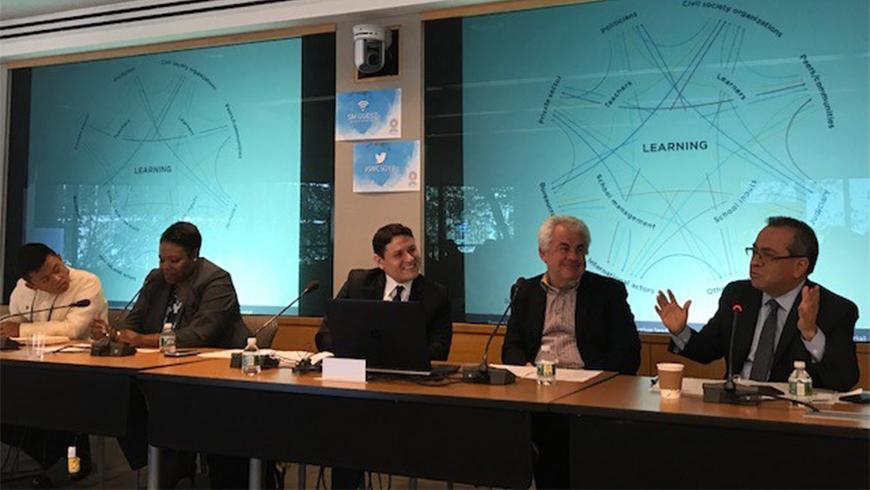Advocating for Strengthening Public Leadership Capacity at the IMF/World Bank Group Spring Meetings

Teach For All brought diverse voices from across the network to the IMF/World Bank Group Spring Meetings in Washington, D.C. last month. Representatives of network partners and the global organization participated in several panels and roundtables highlighting the critical role of civil society as a government partner and the importance of building leadership and management capacity in the public sector as a means to achieving positive learning outcomes and progress towards SDG4.
On April 20, Teach For All hosted the panel Building Public Leadership Capacity in the Education Sector, featuring Jaime Saavedra (Senior Director of Education Global Practice at the World Bank Group), Kaya Henderson (Head of Community Impact at Teach For All’s Global Learning Lab and former Chancellor of D.C. Public Schools), Lant Pritchett (Senior Fellow at the Center for Global Development and Professor of the Practice of International Development at the Harvard Kennedy School of Government), John Carlo Pineda Fernando (Alumni and Government Fellow at Teach for the Philippines), and moderated by Isy Faingold (Director of Policy and Community Impact at Teach For All).
Echoing the themes put forth in this year’s World Development Report on Learning to Realize Education’s Promise, the panelists highlighted the crucial need to build leadership capacity at all levels to fully realize the promise of learning. John Carlo brought the voice of students and teachers into the conversation, sharing experiences from his own classroom in the Philippines. “There are no clear answers for how to solve this problem,” he remarked, “but one of the solutions is to capacitate budding leaders across large systems to create adaptive change.”
Kaya spoke to the vital role of communities and parents in creating the type of systemic, adaptive leadership capacity needed to achieve success in learning. “When a community owns the vision, it doesn’t matter when the leadership changes, they will hold them accountable,” she said. Lant Pritchett built on this idea, stressing that leadership has to be networked and enabling. “If you don’t have public leadership capacity,” concluded Jaime Saavedra, “it’s impossible to have a well-functioning education system.”
The Basic Education Coalition also hosted a panel, moderated by Daniel Stoner, Save the Children’s Vice President for Education and Child Protection and Co-chair of the BEC Board, on Developing leadership capacity to achieve SDG4: Creating impact in and beyond the classroom in the Americas. During the discussion, Luis Benveniste, Practice Director of Education at the World Bank, shared his thoughts on the World Development Report and the role that civil society organizations can play in support of the recommendations it outlines. Luis highlighted the importance of leadership, which was emphasized by Erik Ramirez Ruiz, Co-founder and President of Enseña por México, and Tomas Vergara, Chief Program at Enseña Chile. Both also shared their organizations’ approach to developing the collective leadership necessary to ensure all children have the opportunity to achieve their potential as well as evidence of their impact.
Anna Molero, Teach For All’s Chief Government Officer, was invited to moderate the biannual Civil Society Organizations (CSO) Roundtable with Executive Directors (EDs) of the World Bank, and to lead a dialogue on behalf of the over 1,000 CSO stakeholders who consulted on the shared agenda to discuss the most pressing issues of the day for CSOs and the communities they represent. In closing, Anna reminded those present that “we are at a critical juncture where we must forge stronger partnership between communities and institutions,” and that those in the room “play a vital role in ensuring effective and sustainable progress through the alignment of priorities, coordination of interventions, and a mutual understanding of our shared responsibility.”
Teach For All is excited to be involved in these discussions that are increasing global and regional understanding of the importance of developing public leadership capacity and a stronger collective CSO voice as key contributions to achieving the commitments of the SDG 2030 agenda. Learn more about Teach For All’s engagement in the global discussion of the need for building leadership capacity around the world.



